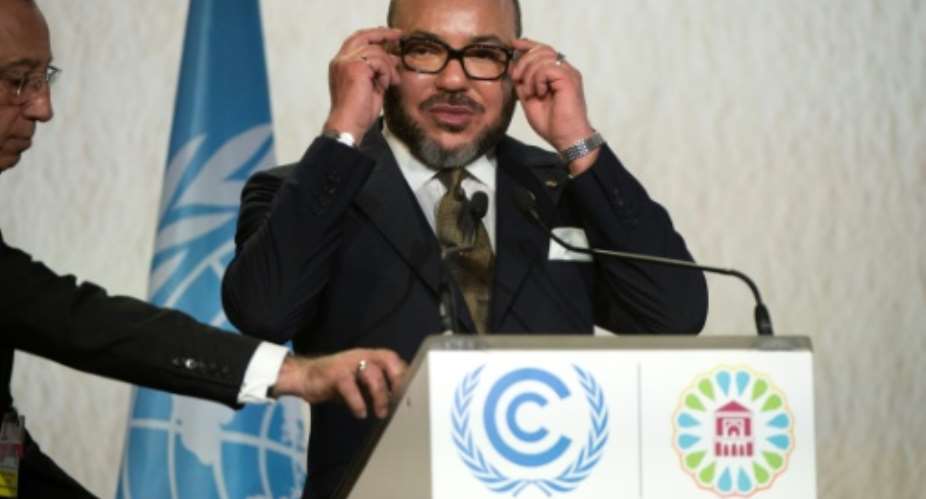Algiers (AFP) - Polisario separatists have dismissed as "window dressing" Morocco's announcement of a pullback from a zone of the contested Western Sahara that has raised tensions with their Algiers-backed movement.
The foreign ministry in Rabat said Sunday that Morocco will "proceed from today with a unilateral withdrawal from the (Guerguerat) zone," in what it said was a decision taken by King Mohamed VI at the request of UN chief Antonio Guterres.
It gave no details on the pullback.
"The Moroccan decision to withdraw its troops near Guerguerat by a few hundred metres is window dressing," the Polisario Front said in a statement later Sunday.
"It barely disguises Rabat's disdain for international legitimacy, its obstinacy and refusal for almost three decades to allow for the implementation" of UN resolutions on the Western Sahara, it said.
The Polisario said it supported the UN secretary general's call "to respect the spirit and the letter of the ceasefire in force since 1991", reiterating its demands for a referendum on self-determination for the Sahrawi people.
 Map of the Western Sahara
Map of the Western Sahara
It accused Morocco of "blocking a settlement, rejecting negotiations" and UN mediation efforts.
Tensions flared in 2016 after the Polisario set up a new military post in Guerguerat near the Mauritanian border, a stone's throw from Moroccan soldiers.
The move came after Morocco last August started building a tarmac road in the area south of the buffer zone separating the two sides.
Morocco and the Polisario fought for control of the Western Sahara from 1974 to 1991, with Rabat taking over the desert territory before a UN-brokered ceasefire in the former Spanish colony.
Rabat considers the Western Sahara an integral part of Morocco and proposes autonomy for the resource-rich territory under its sovereignty.
Spain and France, who shared colonial power in pre-independence Morocco, have both welcomed Rabat's announcement of a Guerguerat pullback and called on the Polisario to follow suit.
Morocco said it started building the tarmacked road, located inside a buffer zone under the 1991 ceasefire, to combat smuggling, and the Polisario has responded by sending in patrols and building a new base.
 Bechir Mohamed, the chief of security in the Al-Mahbes area in the Western Sahara, poses for a photo inside his hut on February 3, 2017
Bechir Mohamed, the chief of security in the Al-Mahbes area in the Western Sahara, poses for a photo inside his hut on February 3, 2017
Newspapers in Rabat say only a four-kilometre (2.5-mile) stretch of the road has been asphalted because Polisario incursions since December have interrupted work.
For the separatists, the work aims to alter the status quo, while Rabat insists on the flow of road traffic for trade between Morocco and sub-Saharan Africa.
Several lorries have been intercepted and truck drivers subjected to insults and stone-throwing in past months, according to Moroccan newspapers.





 Dumsor: Don't rush to demand timetable; the problem may be temporary — Atik Moha...
Dumsor: Don't rush to demand timetable; the problem may be temporary — Atik Moha...
 Space X Starlink’s satellite broadband approved in Ghana — NCA
Space X Starlink’s satellite broadband approved in Ghana — NCA
 2024 election will be decided on the grounds of the economy; choice of running m...
2024 election will be decided on the grounds of the economy; choice of running m...
 Dumsor: We're demanding less; just give us a timetable — Kwesi Pratt to ECG
Dumsor: We're demanding less; just give us a timetable — Kwesi Pratt to ECG
 Do I have to apologise for doing my security work, I won’t – Simon Osei-Mensah r...
Do I have to apologise for doing my security work, I won’t – Simon Osei-Mensah r...
 All my businesses have collapsed under Akufo-Addo — NDC Central regional chair
All my businesses have collapsed under Akufo-Addo — NDC Central regional chair
 Military, Prison Officers clash in Bawku, three injured
Military, Prison Officers clash in Bawku, three injured
 GRA-SML contract: MFWA files RTI request demanding KPMG report
GRA-SML contract: MFWA files RTI request demanding KPMG report
 Court threatens to call second accused to testify if NDC's Ofosu Ampofo fails to...
Court threatens to call second accused to testify if NDC's Ofosu Ampofo fails to...
 Family accuses hospital of medical negligence, extortion in death of 17-year-old...
Family accuses hospital of medical negligence, extortion in death of 17-year-old...
